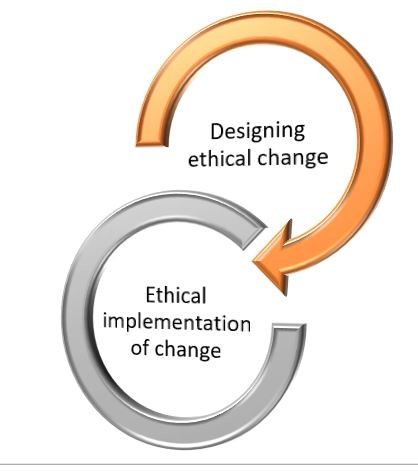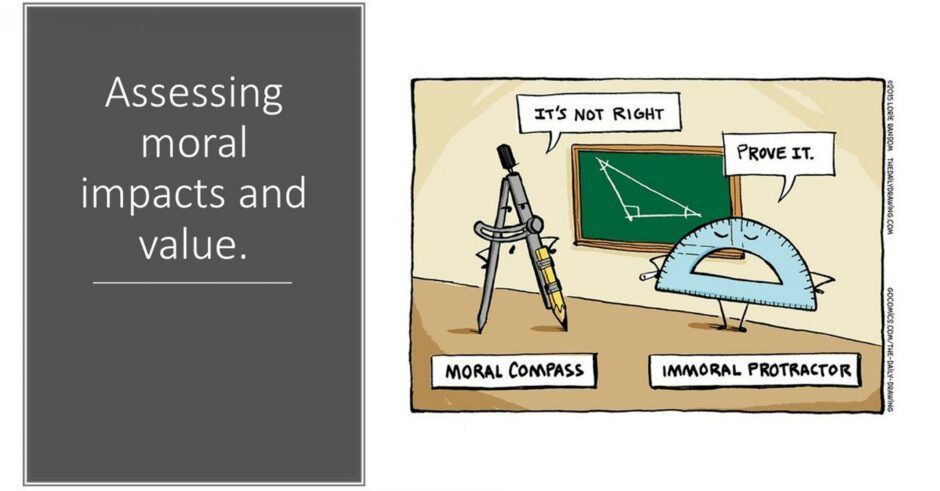Implementing change in a moral and effective way is of little value, if the change itself is morally deficit. Continually assessing moral impacts and worth, from strategy creation through to value realisation, appears to be missing in many project and change management approaches.
Firstly, The Good News
The Effective Change Manager: The Change Management Body of Knowledge (CMBoK) published by the Change Management Institute (CMI), identifies that effective Change Managers use knowledge of ethical considerations, in how they capture information.
A Guide to Project Management Body of Knowledge published by the Project Management Institute (PMI), links organisational governance to project governance, in the following ways:
- legal, regulatory, standards and compliance requirements.
- ethical, social and environmental responsibilities, and
- operational, legal and risk policies.
PMI’s Code of Ethics & Professional Conduct includes:
- “We make decisions and take actions based on the best interests of society, public safety, and the environment.”
PMI’s Ethical Decision-Making Framework also includes questions of:
- “Will your decision have a positive impact or prevent harm to project managers, PMI staff or volunteers, clients, your employer’s organization, other stakeholders, the environment, or future generations?
- Would your choice result in the greatest good?
- Would your choice treat others as you would like to be treated?
- Would your choice be fair and beneficial to all concerned?”
PMI’s Navigating Complexity: A Practice Guide reference moral and ethical complexity, when it differs across countries and societies.
ChangeFirst’s (PCI) approach to Influencing others talks about change champions maximising positive influence in an ethical way.
Prosci’s lead researcher, Robert Stise has gone further.
“Change Management is not just a field; it’s an ethic about how you treat people as individuals. Yes, it can save you money, yes, it can help you meet deadlines, but if we can create a culture where organizations recognize their employees as individuals and can do a better job of helping those individuals through times of change, I think that’s an incredible step forward.”
Now, The Bad News
Various standards and change management methodologies talk to the ethics of how change is implemented and how people are engaged and supported through change, but not ensuring if the change itself is of positive moral worth.
PMI’s Code of Ethics & Professional Conduct and Ethical Decision-Making Framework, that do cover decisions and actions regarding outcomes, sadly are “aspirational and not easily measured” or “aspirational and not mandatory.”
Managing Change in Organizations: A Practice Guide published by the PMI, only mentions ethics once, as a potential external driver of change. PMI’s Benefit Realisation Management: A Practice Guide, does not mention ethics at all.
Ethics Based Model for Change Management by Jibran Bashir and Sara Afzal found:
- “ethics is not a part of any of the three stages of Lewin’s Model”,
- ADKAR Change Model does not include “whether the change itself is conceived as ethical by individuals on which it is going to be implemented,” and
- “the discussion of ethics is not present in Kotter’s 8 Step Model of Change Management.”
Moral Change Management
 Moral change management recognises
Moral change management recognises
if
“the change is morally deficit“
then
“managing the change implementation right“
it is of little value.
As referenced in Are leaders making decisions based on moral principles?, moral change management also accepts:
- a moral decision considers how it impacts the well-being of other people, and the multi-dimensional nature of ‘well-being’ for humans: physical, emotional, economic, social, psychological, safety. freedoms and life satisfaction,
- moral standards “concern behaviour that has serious consequences for human well-being, and they take priority over other standards, including self-interest”,
- a moral decision is logical, based on relevant facts, and supported by an assessment – based on acceptable moral principles – of the moral worth or otherwise, of the associated action, change, activities, outcomes or policies, and
- acceptable moral principles are often those universal human principles of integrity, responsibility, forgiveness and compassion.
As discussed in Employees = humans = equals. Engage them as such in change, treating employees with attention, dignity, and respect as humans of equal value and interest in their organisation, requires moving from ‘engagement in’ to ‘partnership of’ change.
As per PMI’s definition of change management in Managing Change in Organizations: A Practice Guide, change management occurring continuously, from strategy development to business value realisation.
Is this what Moral Change Management could look like?
What does moral change management look like in scenarios such as restructures and mergers, where people lose their jobs?
Layoffs That Don’t Break Your Company notes episodic restructuring and routine layoffs, damage employee engagement and company profitability in the long term. “Companies that shed workers lose the time invested in training them as well as their networks of relationships and knowledge about how to get work done. After a layoff, survivors experienced a 20% decline in job performance.”
This type of workforce change is often “bad” – is unfair or perceived as such by employees, or happening for the “wrong reasons” – achieving short-term goals of managers or the organisation.
“A workforce change strategy should anticipate three different scenarios: a healthy present, short-term economic volatility, and an uncertain future.
- “Senior leaders should practice disciplined hiring and use stringent performance metrics to build a strong organization that can weather change. A lean approach to staffing will help companies avoid yo-yoing between overexuberant hiring during growth and damaging staff reductions when demand falls.”
- “Experienced managers develop a range of ways to reduce costs without resorting to destructive layoffs.”
- “Market shifts, new technologies, and new competition can require companies to do major restructuring. Before considering a layoff” explore options to transition existing resources to supporting new opportunities.
When layoffs are unavoidable, moral change management recognises harm experienced can extend beyond redundant employees, to their families and communities. Large scale layoffs can harm local economies and society. Therefore investment in assisting redundant employees find another job within or outside of the company, retraining and financial assistance, is not just the right thing to do. It improves the performance of the organisation after a restructure.
In conclusion
Everyone involved in change need to apply their knowledge of moral and ethical considerations and responsibilities, for every decision and action taken.


